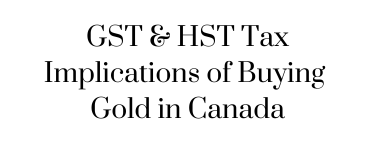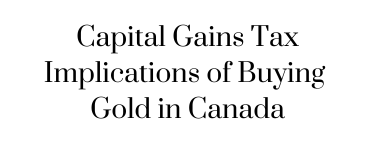
Important note from 401Gold Inc. It's always advisable to consult with a tax professional or accountant who is knowledgeable about Canadian tax laws to understand the specific tax implications of buying gold based on your individual circumstances. They can provide personalized advice based on your situation.
In Canada, the tax implications of buying gold in Canada and other precious metals such as silver or platinum will depend on the specific circumstances of the investment and the applicable tax laws. Here are a few points to consider:
It's important to note that tax laws can change over time and may vary depending on the specific circumstances of the investment. It's a good idea to consult with a tax professional or financial advisor for advice on the tax implications of buying gold in Canada

Example of gold products that incur HST & GST on sale include:

In Canada, the capital gains tax implications of buying gold in Canada may apply when you sell bullion, which includes gold bullion, silver bullion, and other precious metal bullion. The Canada Revenue Agency (CRA) treats bullion as a capital asset, and any profit made from its sale is generally subject to capital gains tax.
When you sell bullion, the capital gain is calculated as the difference between the sale price and the original purchase price. However, only 50% of the capital gain is included in your taxable income. This means that you are taxed on only half of the profit.
The actual tax rate applied to the capital gain depends on your personal income tax bracket. Capital gains are typically taxed at your marginal tax rate, which varies based on your income level. It's important to consult with a tax professional or accountant to determine the exact tax rate applicable to your situation.
It's worth noting that if you incur a capital loss from selling bullion, you may be able to use it to offset other capital gains, reducing your overall tax liability.
As always, the tax implications of buying gold in Canada and their regulations can change, so it's essential to stay updated with the latest information from the CRA or consult a tax professional for accurate and current advice regarding capital gains tax on bullion in Canada.
For information on this matter, please refer to https://www.canada.ca/en/revenue-agency/services/forms-publications/publications/17-1/definition-financial-instrument.html
In the world of finance and investments, precious metals have held a timeless allure as valuable assets. In Canada, these metals, namely gold, platinum, and silver, are defined and regulated under specific guidelines to ensure transparency and reliability in the market. Let's delve into the definition of precious metals and their taxation status in the Canadian financial landscape.
Definition of Precious Metals
According to subsection 123(1) of the Canadian policy, a "precious metal" refers to a bar, ingot, coin, or wafer made of gold, platinum, or silver. To be classified as a precious metal, these items must undergo a refining process to achieve specific purity levels, which are as follows:
Policy Statement: P-192, Supplies of Precious Metals
Under policy statement P-192, the supplies of precious metals in the form of bars, ingots, or wafers at the required purity levels are generally recognized and accepted for trading on Canadian financial markets. These precious metal items typically bear markings that indicate their purity levels and carry an identification mark of the issuing financial institution or refinery.
Coins made of precious metals also qualify, but they must meet the required purity levels and be issued by a government authority for use as currency to be considered eligible for trading.
Taxation and Exemption of Precious Metals
Any supply of a precious metal (gold, platinum, or silver) that meets the defined purity requirements is considered a supply of a financial service and is generally exempt from taxation. Such metals are commonly associated with investment-related activities and are traded on international exchanges that establish global precious metal prices.
However, the sale or purchase of a precious metal that does not comply with the defined purity requirements is not considered a supply of a financial instrument but rather a supply of property. In such cases, taxation applies based on the purity levels and the form of the metal:
It is important for individuals and businesses involved in the trading of precious metals to be aware of these taxation rules to comply with the Canadian tax regulations.
Understanding the definition and taxation of precious metals in Canada is crucial for investors and market participants alike. By adhering to the defined purity levels and taxation guidelines, the precious metal market remains transparent, reliable, and conducive to thriving investment opportunities.